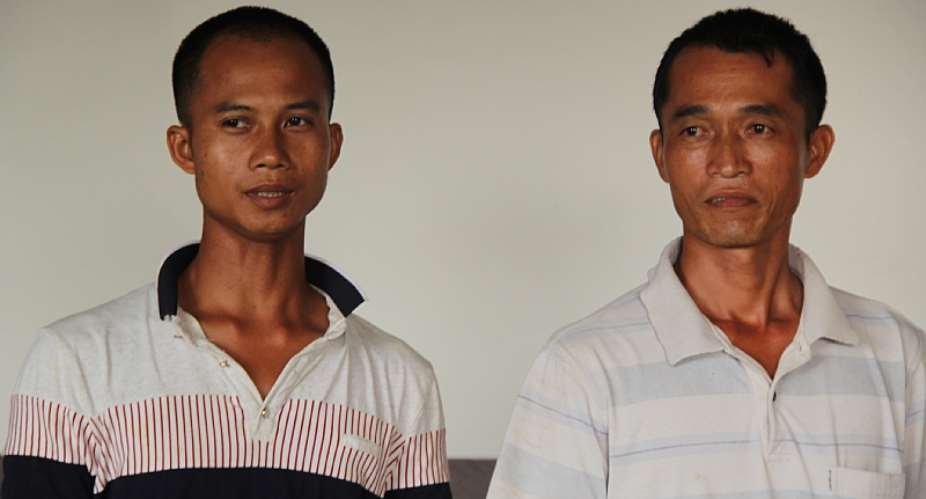The Intelligence Department of the Ghana Cocoa Board(COCOBOD) has arrested two Chinese illegal miners for mining COCOBOD's seed garden in Wassa Saman in the Western region.
The two Chinese, Li Wen Qieng 28, and Mo Sin Shan 35 were arrested for excavating the land in the night for gold, destroying the cocoa seedlings.
Confirming the development to Citi Business News, the Public Relations Officer at COCOBOD Noah Amenyah said that the two Chinese are in police custody assisting in investigations.
Recounting how the Chinese had access to the land, Mr. Amenyah stated that the two Chinese illegal miners through a Ghanaian, named only as Wonder introduced the Chinese miners to the land through his company, Wonder Mining Company Limited.
Mr. Amenyah stated that the Chinese started mining 2 to 3 acres of the land with the help of the Ghanaian, called Wonder.
“A security guard of the of the Seed Production Department of COCOBOD spotted two huge bulldozers with erected canopies mining on the land and drew the attention of the Intelligence Department of COCOBOD to the operation,” he said.

Li Wen Qieng 28 and Mo Sin Shan 35
“After investigations, the culprits were arrested with the assistance of the Ghana Police at Wassa Saman but were granted bail on the same day due to lack of communication,” he added.
According to Mr. Amenyah the Chinese illegal miners went back to mine the garden the same day after they were granted bail on 0ctober 23, 2016.
Mr. Amenyah bemoaned the upsurge of galamsey activities in the area as cocoa farmers are willing to sell their farms to illegal miners in Wassa Saman in the Western South Cocoa region.
Galamsey threatens cocoa production
The Managing Director for cocoa and chocolate producer Barry Callebaut, Ghana, Charity Sackitey, recently warned that the proliferation of illegal mining is negatively affecting the cocoa production.
Crop production for the 2015/16 growing season, which spans October to September, reached 690,000 tonnes, although this fell short of the 850,000-tonne projection made by the Ghana Cocoa Board (COCOBOD), the state promotion and oversight agency.
Yields from both the main harvest and the secondary harvest, which began in late June, were impacted by a prolonged and particularly severe harmattan, a dry wind that blows in from the Sahara Desert, as well as by low rainfall at critical times during the growing cycle.
While most of Ghana's agricultural output is rain-fed, with the drought impacting production across the sector more broadly, cocoa is particularly vulnerable to the harmattan, which dries seeds and erodes yields.
–
By:Lawrence Segbefia/citibusinessnews.com/Ghana





 Former Kotoko Player George Asare elected SRC President at PUG Law Faculty
Former Kotoko Player George Asare elected SRC President at PUG Law Faculty
 2024 elections: Consider ‘dumsor’ when casting your votes; NPP deserves less — P...
2024 elections: Consider ‘dumsor’ when casting your votes; NPP deserves less — P...
 You have no grounds to call Mahama incompetent; you’ve failed — Prof. Marfo blas...
You have no grounds to call Mahama incompetent; you’ve failed — Prof. Marfo blas...
 2024 elections: NPP creates better policies for people like us; we’ll vote for B...
2024 elections: NPP creates better policies for people like us; we’ll vote for B...
 Don’t exchange your life for wealth; a sparkle of fire can be your end — Gender ...
Don’t exchange your life for wealth; a sparkle of fire can be your end — Gender ...
 Ghana’s newly installed Poland train reportedly involved in accident while on a ...
Ghana’s newly installed Poland train reportedly involved in accident while on a ...
 Chieftaincy disputes: Government imposes 4pm to 7am curfew on Sampa township
Chieftaincy disputes: Government imposes 4pm to 7am curfew on Sampa township
 Franklin Cudjoe fumes at unaccountable wasteful executive living large at the ex...
Franklin Cudjoe fumes at unaccountable wasteful executive living large at the ex...
 I'll 'stoop too low' for votes; I'm never moved by your propaganda — Oquaye Jnr ...
I'll 'stoop too low' for votes; I'm never moved by your propaganda — Oquaye Jnr ...
 Kumasi Thermal Plant commissioning: I pray God opens the eyes of leaders who don...
Kumasi Thermal Plant commissioning: I pray God opens the eyes of leaders who don...
